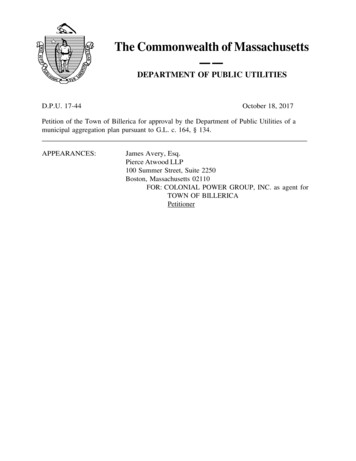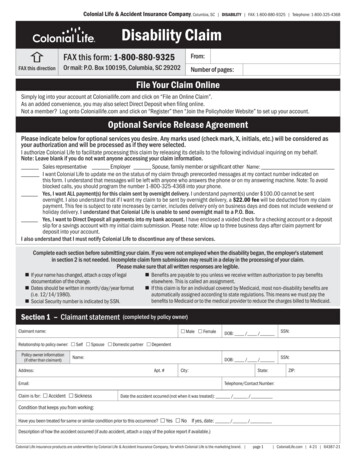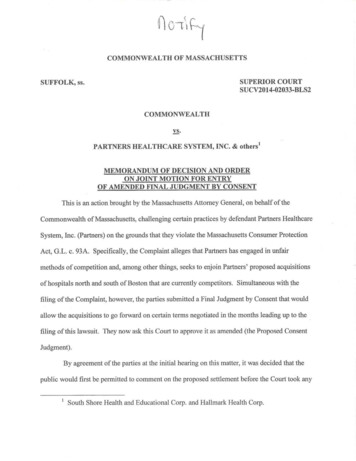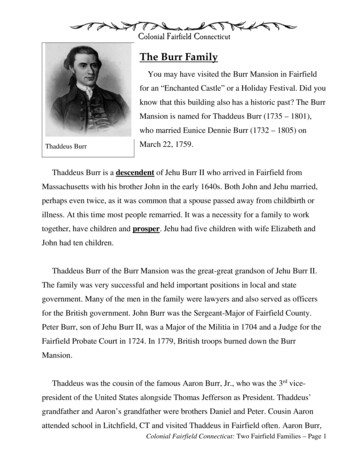
Transcription
The Commonwealth of Massachusetts——DEPARTMENT OF PUBLIC UTILITIESD.P.U. 17-44October 18, 2017Petition of the Town of Billerica for approval by the Department of Public Utilities of amunicipal aggregation plan pursuant to G.L. c. 164, § 134.APPEARANCES:James Avery, Esq.Pierce Atwood LLP100 Summer Street, Suite 2250Boston, Massachusetts 02110FOR: COLONIAL POWER GROUP, INC. as agent forTOWN OF BILLERICAPetitioner
D.P.U. 17-44I.Page 1INTRODUCTION AND PROCEDURAL HISTORYOn April 20, 2017, the Town of Billerica (“Town” or “Billerica”), through its agentColonial Power Group, Inc. (“Colonial”), filed with the Department of Public Utilities(“Department”) a petition for approval of a municipal aggregation plan (“Plan”) pursuant toG.L. c. 164, § 134.1 Under the Plan, Billerica will establish a municipal aggregationprogram (“Program”) through which the Town will aggregate the load of electric customerslocated within its municipal borders in order to procure electric supply for Programparticipants. Eligible customers will be automatically enrolled in the Program unless theychoose to opt out. G.L. c. 164, § 134(a). The Department docketed this matter asD.P.U. 17-44.On June 8, 2017, the Department issued a Notice of Public Hearing and Request forComments (“Notice”).2 On July 13, 2017, the Department conducted a public hearing.3Massachusetts Electric Company d/b/a National Grid (“National Grid”) filed comments onJuly 13, 2017.4 On August 10, 2017, the Town filed responses to the Department’s first set1Colonial is the agent for Billerica. Petition, Att. E.2On April 20, 2017, Colonial filed a petition to intervene. The Department’s Noticedid not seek petitions to intervene. In addition, as agent for the petitioner, Colonialneed not intervene. For these reasons, the Department takes no action on Colonial’spetition.3Pursuant to General Laws c. 164, § 134(a), the Department must hold a publichearing prior to final review and approval of a municipal aggregation plan.4In its comments, National Grid seeks clarification that it is appropriate for it tocontinue to exclude certain groups from the list of “eligible customers” it must
D.P.U. 17-44Page 2of information requests.5 Also on August 10, 2017, the Town filed an updated AggregationPlan and a revised Consumer Notification Form (“opt-out notice”)(Exhs. DPU 1-3, Att.; DPU 1-15, Att.).II.SUMMARY OF THE PROPOSED PLANThe Town has retained Colonial as its agent as well as its consultant to assist in thedesign, implementation, and management of the Program (Plan at 3; Petition at 1, Att. E).The Town and Colonial developed the Plan in consultation with the Department of EnergyResources (“DOER”) and the electric distribution company serving Billerica, National Grid(Letter from DOER to the Town (April 14, 2017)). Billerica’s Board of Selectmen andTown Manager will be responsible for all Program decisions, including the selection of thecompetitive supplier(s), execution of contracts, and termination of the Program(Plan at 3, 6, 9).Under the Plan, the Town will issue a request for proposals to solicit bids fromcompetitive suppliers for firm, all-requirements electric power supply (Plan at 2;Petition, Att. G). The Town will offer one product that will meet the required MassachusettsRenewable Portfolio Standard (“RPS”) obligation (Plan at 15). Prices, terms, and conditionsprovide to a municipal aggregation program. The Department has subsequentlyaddressed these issues in Municipal Aggregation Programs, D.P.U. 16-10(August 23, 2017) and, therefore, we need not address National Grid’s commentshere.5On its own motion, the Department moves Billerica’s responses to InformationRequests DPU-1-1 through DPU-1-18 into the evidentiary record in this proceeding.
D.P.U. 17-44Page 3for electric supply may differ among customer classes (Plan at 11). The Town may offer anoptional product that will include the purchase of renewable energy certificates (“RECs”)above the minimum RPS obligation (Petition at 2; Plan at 15; Exh. DPU 1-14). Customersmay elect the optional power product by calling the competitive supplier’s customer servicenumber (Petition, Exh. H at 4).After executing a contract for electric supply, the Town, through the competitivesupplier, will begin the process of notifying eligible customers about Program initiation andcustomers’ ability to opt out of the Program (Plan at 2, 6-9; Exh. DPU 1-15, Att.). Thenotification process will commence at least 30 days prior to the start of service and willinclude direct mailings, newspaper notices, public service announcements, website postings,social media, and the posting of notices in the Billerica Town Hall (Plan at 6-9; Exh. DPU 13, Att.). Those customers who do not opt out will be automatically enrolled in the Program(Plan at 6-9).The competitive supplier will bear all expenses relating to the opt-out notice(Plan at 5; Petition, Att. G at 8). The Town will require the competitive supplier to includea return-addressed, postage-paid reply envelope with the opt-out notice so that consumerswho sign the opt-out document can protect their signature from being exposed(Exh. DPU 1-15, Att.). Those customers who do not opt out will be automatically enrolledin the Program (Plan at 6-9).Program participants will receive one bill from the distribution company, which willinclude the generation charge and the distribution company’s delivery charge (Plan at 11-12).
D.P.U. 17-44Page 4The Program’s generation charge(s), which will be paid by Program participants, will includea 0.001 per kilowatt hour (“kWh”) administrative adder that will be used to compensate theTown’s consultant for the development and implementation of the Program and ongoingservices including, but not limited to, the issuance of subsequent requests for proposals forcompetitive supply, negotiation of future contracts, and customer service, education, andnotification (Plan at 5, 11). In addition, the Town may implement an operational adder tofund personnel costs associated with an energy manager position, whose duties may includethe preparation of energy consumption analyses; goal-setting, monitoring, and reporting;preparation of grant proposals; conducting public information sessions; and identification ofother cost-saving energy opportunities (Plan at 11; Exh. DPU 1-12). The Town’s Selectmenwill periodically set the operational adder and the Town expects that it will initially be set atapproximately 0.00025 per kWh (Exh. DPU 1-12).The Town requests a waiver, on its behalf and on behalf of its competitive supplier,from the information disclosure requirements contained at 220 CMR 11.06. Such regulationsrequire competitive suppliers to mail information disclosure labels directly to customers on aquarterly basis (Petition at 3-4).6 As good cause for the waiver, the Town states that it canprovide this information more effectively and at a lower cost using means other than thosespecified in the Department’s regulations, including press releases, public service6The disclosure label provides information regarding a competitive supplier’s fuelsources, emission characteristics, and labor characteristics. 220 CMR 11.06.
D.P.U. 17-44Page 5announcements on cable television, newsletters, postings at Town Hall, and postings on theTown’s and/or consultant’s website (id. at 3-4).III.STANDARD OF REVIEWGeneral Laws c. 164, § 134(a) authorizes any municipality or group of municipalitiesto aggregate the electrical load of interested customers within its boundaries, provided thatthe load is not served by a municipal light plant. Upon approval by the local governingentity or entities, a municipality or group of municipalities may develop a municipalaggregation plan, in consultation with DOER and for review by its citizens, providingdetailed information to customers on the process and consequences of aggregation.G. L. c. 164, § 134(a). A municipal aggregation plan must provide for universal access,reliability, and equitable treatment of all classes of customers and meet any requirementsestablished by law concerning aggregated service. Id.A plan must include: (1) the organizational structure of the program, its operations,and its funding; (2) details on rate setting and other costs to its participants; (3) the method ofentering and terminating agreements with other entities; (4) the rights and responsibilities ofprogram participants; and (5) the procedure for termination of the program. Id. Municipalaggregation plans must be submitted to the Department for final review and approval. Id.Participation in a municipal aggregation plan is voluntary and a retail electriccustomer has the right to opt out of plan participation. Id. Municipalities must informelectric customers of: (1) automatic plan enrollment and the right to opt out; and (2) otherpertinent information about the plan. Id.
D.P.U. 17-44Page 6The Department’s review will ensure that the plan meets the requirements ofG.L. c. 164, § 134, and any other statutory requirements concerning aggregated service. Inaddition, the Department will determine whether a plan is consistent with provisions in theDepartment’s regulations at 220 CMR 11.01 et seq. that apply to competitive suppliers andelectricity brokers. Although the Department’s regulations exempt municipal aggregatorsfrom certain provisions contained therein, the regulations provide no such exemption for thecompetitive suppliers that are selected to serve a municipal aggregation load.220 CMR 11.01 et seq.A municipal aggregator is exempt from two requirements included in theDepartment’s regulations concerning competitive supply. First, a municipal aggregator is notrequired to obtain a license as an electricity broker from the Department under220 CMR 11.05(2) in order to proceed with an aggregation plan. City of Marlborough,D.T.E. 06-102, at 16 (2007). Second, a municipal aggregator is not required to obtaincustomer authorization to enroll customers in the program pursuant to G.L. c. 164,§ 1F(8)(a) and 220 CMR 11.05(4). Id. The opt-out provision applicable to municipalaggregators replaces the authorization requirements included in the Department’s regulations.Id.A competitive supplier chosen by a municipal aggregator is not exempt from otherapplicable Department regulations. Id. To the extent that a municipal aggregation planincludes provisions that are not consistent with Department regulations, the Department willreview these provisions on a case-by-case basis. Id.
D.P.U. 17-44IV.Page 7ANALYSIS AND FINDINGSA.Consistency with G.L. c. 164, § 1341.Procedural and Filing RequirementsGeneral Laws c. 164, § 134, establishes several procedural and filing requirements fora municipal aggregation plan. First, a municipality must obtain the authorization of certainlocal governing entities prior to initiating the process to develop an aggregation plan.G.L. c. 164, § 134(a).7 The Town provided meeting minutes demonstrating local approvalthrough an affirmative vote at Town Meeting prior to initiating the process of aggregation(Petition at 1, Att. C). Therefore, the Department concludes that Billerica has satisfied thestatutory requirement regarding local governmental approval.Second, a municipality must consult with DOER in developing its municipalaggregation plan. G.L. c. 164, § 134. DOER submitted a letter to the Departmentconfirming that the Town completed its consultation (Letter from DOER to Town(April 14, 2017)). Therefore, the Department concludes that Billerica has satisfied thestatutory requirement regarding consultation with DOER.Third, a municipality, after development of a plan in consultation with DOER, mustallow for citizen review of the plan. G.L. c. 164, § 134. General Laws c. 164, § 134(a) issilent on the process a municipality must use to satisfy citizen review of a municipal7A town may initiate a process to aggregate electrical load upon authorization by amajority vote of town meeting or town council. A city may initiate a process toauthorize aggregation by a majority vote of the city council, with the approval of themayor or, where applicable, the city manager. G.L. c. 164, § 134(a).
D.P.U. 17-44Page 8aggregation plan. The Department, however, requires municipalities to allow citizenssufficient opportunity to provide comments on a proposed plan prior to the municipality filingits plan with the Department. Cape Light Compact, D.P.U. 14-69, at 42 (2015);Town of Ashby, D.P.U. 12-94, at 27 (2014).The Town provided documentation demonstrating that municipal officials and itsconsultant presented the Plan at a public meeting of the Board of Selectmen onNovember 21, 2016 (Petition, Att. F). In addition, Billerica made the Plan available at theTown Clerk’s office and posted it on the Town’s website for approximately three weeks(Petition at 2, Att. F). Therefore, the Department concludes that Billerica has satisfied thestatutory requirement regarding citizen review.Finally, a municipal aggregation plan filed with the Department shall include: (1) theorganizational structure of the program, its operations, and its funding; (2) details on ratesetting and other costs to its participants; (3) the method of entering and terminatingagreements with other entities; (4) the rights and responsibilities of program participants; and(5) the procedure for terminating the program. G.L. c. 164, § 134. After review, theDepartment finds that the Plan includes each of these components (Plan at 2-15).Accordingly, the Department concludes that Billerica has satisfied all statutory procedural andfiling requirements.
D.P.U. 17-44Page 92.Substantive Requirementsa.IntroductionMunicipal aggregation plans must provide for universal access, reliability, andequitable treatment of all classes of customers. G.L. c. 164, § 134(a). In addition,municipalities must inform electric customers prior to their enrollment of their right to optout of the program and disclose other pertinent information regarding the plan.8 Id.b.Universal AccessThe Department has stated that the universal access requirement is satisfied when amunicipal aggregation program is available to all customers within the municipality. City ofLowell, D.P.U. 12-124, at 44-46 (2013); D.T.E. 06-102, at 19; Cape Light Compact,D.T.E. 00-47, at 24 (2000). Under the Plan, all eligible customers in the Town will betransferred to the Program unless the customer previously contracted with a competitivesupplier or affirmatively opts out of the Program (Plan at 7, 13; Exh. DPU 1-10). Newcustomers moving to the Town initially will be placed on basic service and then will receivean opt-out notice informing the customer that they will be automatically enrolled in theProgram unless they opt out (Plan at 7, 13; Exh. DPU 1-10). The Plan provides thatcustomers may return to basic service at any time (Plan at 3, 8-9, 13). After review, theDepartment concludes that the Town has satisfied the requirements of G.L. c. 164, § 134(a)8The municipal disclosures must: (1) prominently identify all rates under the plan;(2) provide the basic service rate; (3) describe how to access the basic service rate;and (4) disclose that a customer may choose the basic service rate without penalty.G.L. c. 164, § 134(a).
D.P.U. 17-44Page 10regarding universal access. Town of Natick, D.P.U. 13-131, at 19-20 (2014);D.P.U. 12-124, at 45-46; D.T.E. 06-102, at 20.c.ReliabilityA municipal aggregation plan must provide for reliability. G.L. c. 164, § 134(a).The contract that the Town will enter into with the competitive supplier contains provisionsthat commit the competitive supplier to provide all-requirements power supply, to make allnecessary arrangements for power supply, and to use proper standards of management andoperations (Plan at 2-4; Petition, Att. G). In addition, Billerica will use the services of aconsultant that is also a licensed electricity broker (overseen by the Board of Selectmen andTown Manager) to ensure that the Town has the technical expertise necessary to operate amunicipal aggregation program (Plan at 2-5; Att. E). After review, the Departmentconcludes that the Town has satisfied the requirements of G.L. c. 164, § 134(a) regardingreliability. D.P.U. 14-69, at 45; D.P.U. 13-131, at 20; D.P.U. 12-124, at 46.d.Equitable Treatment of All Customer ClassesA municipal aggregation plan must provide for equitable treatment of all customerclasses. G.L. c. 164, § 134(a). Equitable treatment of all customer classes does not meanthat all customer classes must be treated equally; rather, customer classes that are similarlysituated must be treated equitably. D.P.U. 14-69, at 10-16, 45-47; D.T.E. 06-102, at 20.
D.P.U. 17-44Page 11Here, the Plan allows for varied pricing, terms and conditions for different customerclasses (Plan at 10-13).9 This feature of the Plan’s design appropriately takes into accountthe different characteristics of each customer class. D.P.U. 13-131, at 22-25;D.P.U. 12-94, at 32; D.P.U. 12-124, at 47. After review, the Department finds the Townhas satisfied the requirements of G.L. c. 164, § 134(a) regarding equitable treatment of allcustomer classes.e.Customer EducationGeneral Laws c. 164, § 134(a), provides that it is the “duty of the aggregated entityto fully inform participating ratepayers” that they will be automatically enrolled in themunicipal aggregation program and that they have the right to opt out. It is critical thatcustomers, including customers with limited English language proficiency, are informed andeducated about a municipal aggregation plan and their right to opt out of the program,especially in light of the automatic enrollment provisions afforded to these plans.D.T.E. 06-102, at 21. Further, while the statute is silent regarding customer education aftera customer is enrolled in the municipal aggregation program, the Department expects theTown will continue to provide customers with information regarding the ongoing operationsof the Program. D.P.U. 14-69, at 48; Town of Dalton, D.P.U. 13-136, at 23 (2014). TheTown’s filing includes an Education and Information Plan that addresses customer education(Petition, Exh. H).9The customer classes in the Program will be the same as National Grid’s customerclasses (Plan at 10-11; Petition, Att. G at exh. A).
D.P.U. 17-44Page 12The Town intends to inform customers of their right to opt out and provide otherpertinent information about the Program, where appropriate, in multiple languages, throughnewspapers, public and cable television, public meetings, electronic communication, atoll-free customer service line, and a direct mail component including the opt-out notification(Plan at 6-8; Exhs. DPU 1-3, Att.; DPU 1-15, Att.). The form and content of the revisedopt-out notice filed by the Town on August 21, 2017 is consistent with the Department’srequirement that opt-out notices be sent in clearly marked Town envelopes that state theycontain information regarding customers’ participation in the Program (Exh. DPU 1-15,Att.). D.P.U. 13-131, at 26-27.The Town shall make certain that Program enrollments begin no sooner than 36 daysafter mailing of the opt-out notice. Such timing will ensure that eligible customers have afull 30 days to opt out, plus an additional six days to account for mailing (i.e., three days forthe opt-out notice to be delivered to the customer and three days for the opt-out document tobe delivered to the competitive supplier through the mail). Town of Orange, D.P.U. 17-14,at 11-12 (2007).In addition, in order to ensure that no customers who wish to opt out areautomatically enrolled in the Program, the Department has determined that municipalitiesshall identify the actual date by which customers must postmark the opt-out document,consistent with the timing described above. D.P.U. 17-14, at 12. The Department hasfurther found that such language must appear in a prominent location and color at the top ofthe first page of the opt-out notice as well as on the opt out reply card, and must inform
D.P.U. 17-44Page 13eligible customers that they will be automatically enrolled in the Program unless they returnpostmark the opt-out document by the identified date. D.P.U. 17-14, at 12In an information request issued August 10, 2017, the Department requested that theTown submit a revised opt-out notice containing similar language in color in a prominentlocation on the top portion of the opt-out notice (Exh. DPU 1-17(a)). In its revised opt outnotice submitted on August 21, 2017, the Town did not make the change as requested inDPU 1-17(a) (Exh. DPU 1-15).10 Instead, the Town asserts that its current opt-out noticealready prominently identifies the requested language in an appropriate location that has beenaccepted by the Department in other dockets (Exh. DPU 1-17(a), citing e.g., Town ofAbington, D.P.U. 17-08, at 11-12 (2017)).In light of the automatic enrollment provisions afforded to these plans, it is absolutelyessential that customers are clearly informed and educated about a municipal aggregation planand their right to opt out of the program. To this end, the Department reviews the form andcontent of consumer notifications issued by municipal aggregations. As the Departmentcontinues to gain experience with the operation of municipal aggregation programs, it is fullyanticipated that the Department will refine its position on the adequacy and clarity ofconsumer notifications. Based on such experience, the Department has determined that it isnot optimal to group essential language regarding automatic enrollment and the deadline toact together with other information in the body of the opt-out notice. Instead, consistent with10The revised opt out notice was submitted in response to a separate information requestissued on August 10, 2017 (Exh. DPU 1-15).
D.P.U. 17-44Page 14the Department’s directives in D.P.U. 17-14, at 12, the Town shall identify the actual dateby which customers must postmark the opt-out document based on the timing describedabove. The Town shall include language informing all eligible customers that they will beautomatically enrolled in the Program unless they return postmark the opt-out document bythe identified date in a prominent location and color at the top of the first page of the opt-outnotice, as well as on the reply card itself.11,12 D.P.U. 17-14 at 12. The Town shall file arevised opt-out notice and opt-out reply card consistent with the directives contained hereinfor Department review.13The Department notes that municipal aggregations may seek competitive supply ratesthat provide savings for participating electric customers compared to basic service rates.While the Department supports this goal, due to changes in market conditions and differencesin contract terms, a municipal aggregation cannot guarantee customers cost savings compared11In the event that the opt-out notices will be printed entirely in black and white, theTown may include the language in bold black type in the specified location instead ofin color. However, if the opt-out notice includes color text, this language must beincluded in color.12In addition to adding this language to the top of the opt-out notice, the Town mayrepeat such language beneath the comparison chart as it appears in the version of theopt-out notice contained in Exhibit DPU 1-15.13The post-mark date may be left blank on the revised opt-out notice and reply cardfiled in accordance with this Order if the date is not yet known. In addition, prior tothe start of the 30-day opt-out period, the Town must submit a copy of the finalopt-out notice it intends to issue to the Director of the Department’s ConsumerDivision for review and approval prior to issuance. The final opt-out notice shall alsobe filed in the instant docket, in a manner consistent with the Department’s filingrequirements. 220 CMR 1.02.
D.P.U. 17-44Page 15to basic service. D.P.U. 12-124, at 61-66. Municipalities must fully inform customersabout the plan, including the benefits and consequences of municipal aggregation.G.L. c. 164, § 134(a). Therefore, the Department has found that municipalities must clearlyexplain in a plan and all education materials distributed prior to program implementation thatcustomers are not guaranteed cost savings compared to basic service. City of Gloucester,D.P.U. 16-101, at 13 (2017).On August 21, 2017, in response to a Department information request, the Townproposed to revise certain Plan language in the section entitled “Purpose of the EvaluationPlan” (Exh. DPU 1-3, Att. at 1). Specifically, the Town proposes to revise the language toread “the Town seeks to take greater control of its energy options, including enhancing theability to pursue price stability, savings opportunities and the amount of renewable energy tobe procured” (emphasis added) (Exh. DPU 1-3, Att. at 1). The Town shall revise its Plan toinclude the qualifier “however, savings cannot be guaranteed” at the end of this section.Similarly, the revised opt-out notice filed on August 21, 2017, describes savings inone instance without the required qualifying language that such savings cannot be guaranteed(Exh. DPU 1-15, Att.). In the revised opt-out notice to be filed in compliance with thisOrder, the Town shall include the appropriate qualifying language in each instance wheresavings are described.1414Such language appears on the first page of the opt-out notice under the heading“Important Information” with the sentence, “The goal of the aggregation is to deliversavings over the life of the Program against National Grid’s Basic Service Rate”
D.P.U. 17-44Page 16The Town shall file the revised Plan, opt-out notice, and opt-out reply card within 14days of the date of this Order. The Department will review these materials for compliancewith the directives specified above. After review, and with the modifications to the opt-outnotice, opt-out reply card, and Plan required above, the Department concludes that the Townhas satisfied the requirements of G.L. c. 164, § 134(a) regarding customer education.B.Waiver from Department Regulations Regarding Information DisclosureGeneral Laws 164, § 134, requires that a municipal aggregation plan meet anyrequirements established by law or the Department concerning aggregated service. In thisregard, Billerica has requested a waiver, on behalf of itself and its competitive supplier, fromthe information disclosure requirements contained in 220 CMR 11.06(4)(c). TheDepartment’s regulations at 220 CMR 11.08 permit a waiver from these regulations for goodcause shown. As good cause for the waiver, the Town maintains that the competitivesupplier can provide the same information more effectively and at a lower cost throughalternate means (Petition at 3-4).Billerica’s proposed information disclosure strategy is similar to the strategiesapproved by the Department in other municipal aggregation plan proceedings. See e.g.,D.P.U. 13-131, at 29-31; Town of Greenfield, D.P.U. 13-183, at 27-29 (2014). TheDepartment finds that Billerica’s proposed alternate information disclosure strategy will allowthe competitive supplier to provide the required information to its customers as effectively as(Exh. DPU 1-15, Att.). At the end of this sentence, the Town shall add the qualifier“however, such savings cannot be guaranteed.”
D.P.U. 17-44Page 17the quarterly mailings required under 220 CMR 11.06(4)(c). Accordingly, pursuant to220 CMR 11.08, the Department grants the Town’s request for a waiver from220 CMR 11.06(4)(c) on behalf of itself and its competitive supplier.15 Billerica and itscompetitive supplier are required to adhere to all other applicable provisions of220 CMR 11.06.V.OTHER REQUIREMENTSIn addition to the requirements set forth in G.L. c. 164, § 134, as discussed above,the Town shall comply with all additional requirements for municipal aggregations as setforth by the Department. See e.g. D.P.U. 12-124, at 61-66 (prohibiting the practice ofsuspension); D.P.U. 13-131-A at 10 (program pricing for customers that join a municipalaggregation program after initiation); D.P.U. 14-69, at 29-30 (requirements for revising amunicipal aggregation plan); Town of Lanesborough, D.P.U. 11-27, at 24 (2011) (noticerequirements to local distribution company).The Town shall submit an annual report to the Department by December 1st of eachyear. The annual report shall, at a minimum, provide: (1) a list of the Program’scompetitive suppliers over the past year; (2) the term of each energy supply agreement;(3) monthly enrollment statistics by customer class (including customer additions andwithdrawals); (4) the number and percentage of customers that opted-out of the Program over15This waiver is only for the Billerica Program. The competitive supplier mustcontinue to adhere to the applicable provisions of 220 CMR 11.06 for its othercustomers.
D.P.U. 17-44Page 18the past year; (5) a brief description of any renewable energy supply options included in theProgram; (6) a detailed discussion (with all relevant documentation) addressing Town andcompetitive supplier compliance with the alternative information disclosure strategy approvedin Section IV.B, above; and (8) evidence documenting that the Town has fully complied withall provisions contained in its Education and Information Plan (including, at a minimum,copies of Town Meeting notices, minutes of any such meetings, and screenshot images of allrelevant pages of the websites of the Town and Consultant). The Town’s first annual reportshall be filed on or before December 1, 2017.VI.CONCLUSIONConsistent with the discussion above, the Department finds that the Plan satisfies allprocedural and filing requirements contained in G.L. c. 164, § 134. In addition, with thewaiver from the information disclosure requirements contained in 220 CMR 11.06(4)(c)allowed above, and subject to all required modifications to the Plan, opt-out notice, and optout reply card addressed herein, the Department finds that the Plan meets all substa
Petition of the Town of Billerica for approval by the Department of Public Utilities of a municipal aggregation plan pursuant to G.L. c. 164, § 134. APPEARANCES: James Avery, Esq. Pierce Atwood LLP 100 Summer Street, Suite 2250 Boston, Massachusetts 02110 FOR: COLONIAL POWER GROUP, INC. as agent for TOWN OF BILLERICA Petitioner










